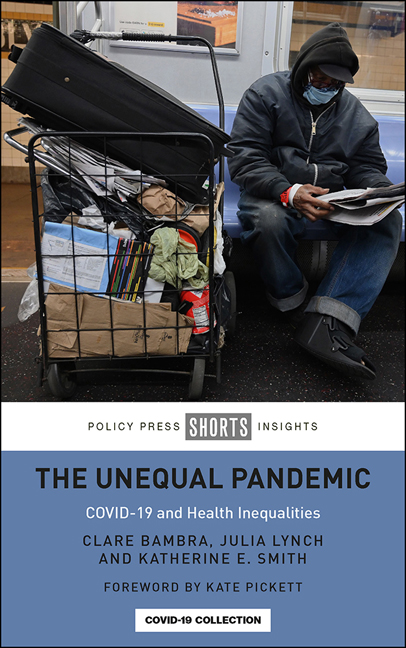Book contents
- Frontmatter
- Contents
- List of figures and tables
- About the authors
- Acknowledgements
- Foreword
- Preface
- one Introduction: perfect storm
- two Pale rider: pandemic inequalities
- three Collateral damage: inequalities in the lockdown
- four Pandemic precarity: inequalities in the economic crisis
- five Pandemic politics: inequality through public policy
- six Conclusion: health and inequality beyond COVID-19
- Notes
- References
- Index
Preface
Published online by Cambridge University Press: 04 January 2022
- Frontmatter
- Contents
- List of figures and tables
- About the authors
- Acknowledgements
- Foreword
- Preface
- one Introduction: perfect storm
- two Pale rider: pandemic inequalities
- three Collateral damage: inequalities in the lockdown
- four Pandemic precarity: inequalities in the economic crisis
- five Pandemic politics: inequality through public policy
- six Conclusion: health and inequality beyond COVID-19
- Notes
- References
- Index
Summary
In 1931 Edgar Sydenstricker identified inequalities in the 1918 Spanish flu epidemic, reporting a significantly higher incidence among the working classes. This challenged the widely-held popular, political and scientific consensus of the time that claimed ‘the flu hit the rich and the poor alike’. In the 2020 COVID-19 pandemic, there have been parallel claims made by politicians and the media: that we are ‘all in it together’ and that the COVID-19 virus ‘does not discriminate’.
This book aims to dispel the emerging myth of COVID-19 as an ‘equality of opportunity’ disease, by outlining how, just as 100 years ago, the pandemic is experienced unequally across society. COVID-19 and inequality are a syndemic: a perfect storm. Drawing on international data and accounts, the book will argue that the pandemic is unequal in four ways:
The pandemic kills unequally: COVID-19 deaths are twice as high in the most deprived neighbourhoods of England as in the most affluent; infection rates are higher in the more deprived regions, such as the northeast of England, and in urban compared to rural areas. There are also significant inequalities by ethnicity and race, with the mortality of ethnic minorities in the UK considerably higher than expected, and the death rates of Black Americans in US cities such as Chicago are far higher than for their White counterparts. This is because of the interaction of the pandemic with existing social, economic and health inequalities.
The pandemic is experienced unequally: the COVID-19 lockdowns have resulted in a significant increase in social isolation and confinement within the home and immediate neighbourhood for an average of 10–12 weeks. The social and economic experiences of this lockdown are unequal as lowerincome workers are more likely to experience job and income loss, live in higher-risk urban and overcrowded environments, and have higher exposure to the virus by occupying key worker roles.
The pandemic impoverishes unequally: COVID-19 and the lockdowns have resulted in an unprecedented shock to the economy, with widespread predictions of the worst recession for 300 years.
- Type
- Chapter
- Information
- The Unequal PandemicCOVID-19 and Health Inequalities, pp. xiii - xivPublisher: Bristol University PressPrint publication year: 2021



